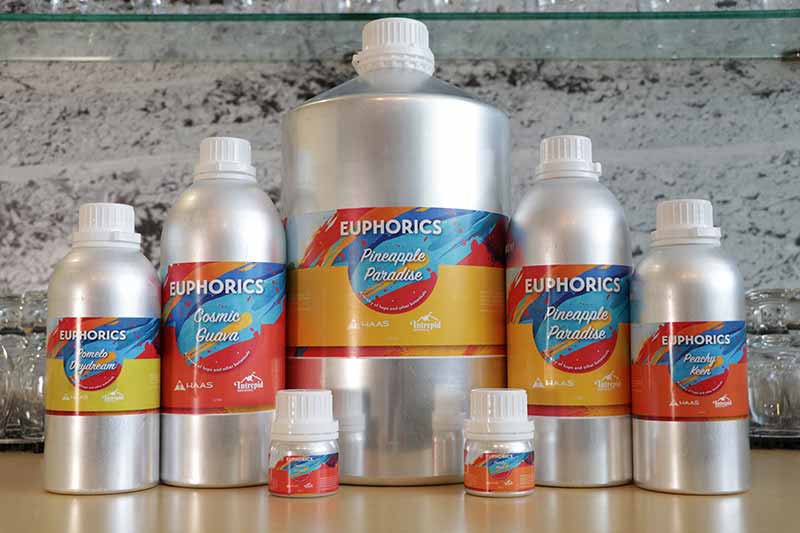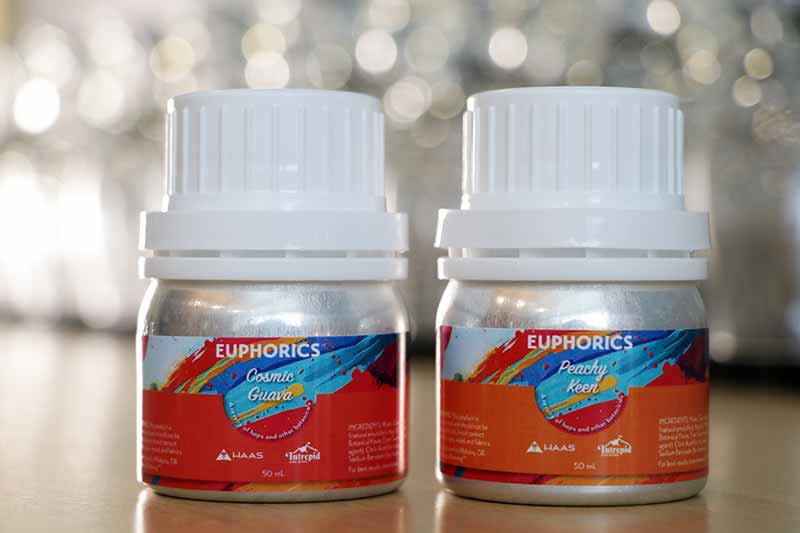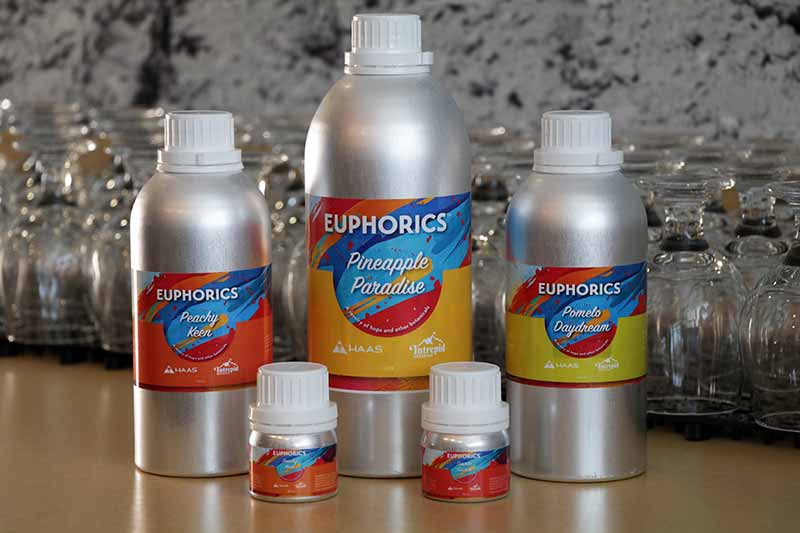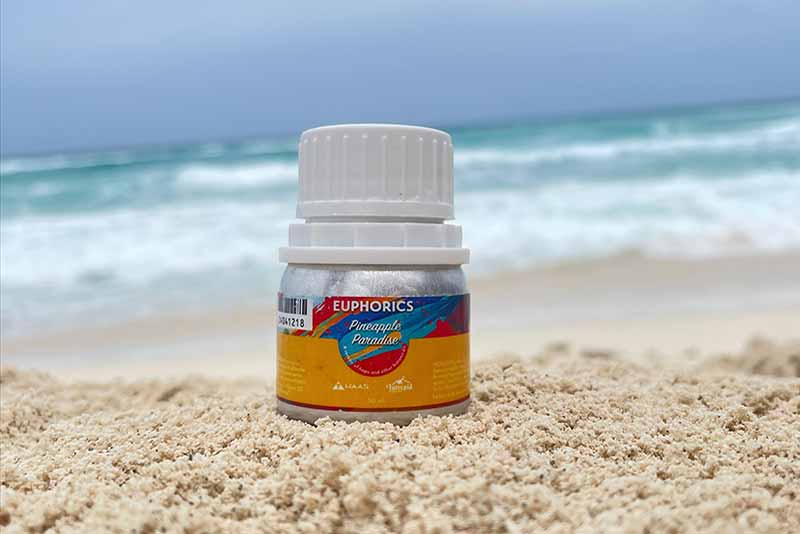
The John I. Haas company is no stranger to hop innovations. Haas has created numerous flowable hop products that cover the bases of all phases of a brew cycle. If you want to add bitterness, try FLEX®; for something in the whirlpool, use Incognito®; and for dry-hop additions, implement SPECTRUM®. Additionally, Haas created HopHaze to help beers maintain a stable haze and HopKick to boost flavor and aroma in all beverages—which you add as close to the end of brewing as possible. Accordingly, we weren’t surprised to see Haas recently unveil a new liquid hop product, Euphorics™, that will add oomph to the flavor and aroma of your finished beer.
We chatted with Haas’ Associate Process Scientist Caitlin Rippner and Varietal Beer Company Owner, Head Brewer, and President Chris Baum, an early user of Euphorics, to learn about the product’s R&D process, how to use it, its benefits, which style of beer it works best with, and how much money it can save you.
(Above photography courtesy of John I. Haas)
Affordable, Industry-Leading Brewery Software
What Is Euphorics?
Euphorics is John I. Haas’ latest hop innovation. According to the product page, it is a water-soluble flavor and aroma liquid hop “made with one hundred percent natural hops and botanicals.”
“Euphorics is intended to provide flexibility for brewers to get punchy flavors and aromas,” Rippner says. “[And] to complement what they have [in the finished beer].”
Haas presented Euphorics at the Craft Brewers Conference earlier this year, releasing the product commercially on May 20, 2024. Currently, there are four varietals: Cosmic Guava, Peachy Keen, Pineapple Paradise, and Pomelo Daydream. Rippner says that’s only the beginning.
“Our goal is to present twenty-five over time,” she says. “There are a lot in development right now.”
John I. Haas Explains Euphorics R&D

Photography courtesy of John I. Haas
As project leader for Euphorics, Rippner says that Haas wanted to explore flavors more, and to achieve that, they partnered with True Terpenes.
“[True Terpenes] has deep expertise in flavor, specifically on the cannabis side of things,” Rippner explains, noting the partnership started about five years ago with R&D in progress for the past couple of years to “find the right flavors.”
Rippner notes that with True Terpenes’ expertise in cannabis and flavor, plus Haas’ dedication to improving things from a brewing process, the two worked together to find strains of cannabis that complemented particular hop flavor and aroma profiles—not any specific varietal, but more the profile it brings.
“We’ve been doing a ton of work to provide the best product we can,” Rippner says.
After potential flavors passed sensory tests, Haas sent Euphorics to partner breweries who would test them on a small scale.
Baum remembers trying Euphorics around the hop harvest last year—though he says Haas kept the product under wraps, so he just referred to it as the “secret sauce.”
“I remember a scientist asked me to check this product out, and he poured some macro IPA of some kind into a glass,” Baum says. “I smelled it, tasted it, and then the scientist dipped the tip of a toothpick in this jar and then into the glass of beer I had and handed it back to me. It completely changed the beer.”
Baum adds, “It had way more intense aroma. Added depth and complexity. I kept bugging them about it [over the following months], and when it came to trials, it made sense for us to be involved with it.”
What Are the Benefits of Euphorics?
Using euphorics has several benefits, but Rippner quickly notes one right off the bat.
“It’s super potent,” she says.
A small amount of Euphorics creates a considerable level of flavor and aroma. “This is going to focus on a blend of fruit, herbs, and hops,” she says. “[But] it’s not trying to replace hops that brewers use in their beer.”
Rippner also notes that Euphorics is all-natural, has a preservative, and remains consistent year over year.
“It can also replace fruit,” she says. “And is an easier-to-use alternative to fruit purees.”
Baum says that any brewer, especially those who package beer, will appreciate the yield.
“There is a lot of aroma and flavor impact, and you don’t have a trub pile or fruit pulp to get in the way [of increasing] the yield,” Baum says. “That’s the biggest thing.”
Additionally, Baum finds Euphorics easy to use and test, often blending different varieties with good results.
“It’s easy to do bench trials—beaker and pipette—and you can gauge,” he says. “I’ve been blending them to get nuanced layering out of them; I’ve been happy with that.”
Baum adds that, while the main benefit of Euphorics is the yield, he believes it infuses well into the beer. He typically gives Euphorics about a day to sit in the tank to infuse throughout, but he notes that you can taste it immediately.
What Is the Dosage Rate of Euphorics?

Photography courtesy of John I. Haas
Euphorics’ dosage rate varies depending on the beverage. The recommended range for beer, non-alc beer, and kombucha is 0.003 to 0.010 percent. For hop waters and teas, the dosage range should be between 0.001 and 0.006 percent. And for hard seltzers, flavored malt beverages (FMB), and ready-to-drink (RTD) options, the range is 0.001 to 0.010 percent.
Rippner says the beer dosage they find best is right in the middle.
Rippner recommends 0.006 percent. “But brewers do try to go higher in different beers. It’s up to how brewers want to use it.”
Baum doses outside that recommended range.
“We dose around 0.13 percent; it’s a low dose,” Baum says. Liquid hops can sometimes result in the occasional haze, but “at the levels we dose, I don’t see any haze,” says Baum.
Rippner says for hop teas and waters, the range should be closer to the lower end.
She says “0.001 percent in a hop water might be sufficient.”
Baum doses hop water at a lower rate than his beer, but still more than Rippner and Haas recommend.
“In our hop water, we dose even lower—about thirty-five millileters in ten barrels,” he says. “It’s like 0.07 percent.”
Rippner says if you want to get the most bang for your buck, it’s best to inject Euphorics in the brite tank or even in a keg. Doing so before sending it through a centrifuge means it won’t taste as potent, she says.
“You can dose it any time after fermentation is complete,” Rippner says. “But take out the yeast to avoid any unexpected results.”
Euphorics has no alphas, so Rippner highly recommends using Euphorics as a cold-side addition. The hotter the liquid, the faster it will volatilize out.
“If it’s in the brite when you did everything—dropped out everything, carbed it—it’ll give you the best idea,” Baum says. “I think for what you’re paying for it and the impact of it, there’s nothing to be gained by adding it early, but anywhere on the cold side, it will work.”
How Much Cost Savings Does Euphorics Bring?
Cost will always be a factor in brewing, but it isn’t black and white. Baum says the savings you see from Euphorics depends on usage.
“If you’re someone using a thiol-cleaving yeast and that cost is expensive for you, I could see it being cheaper to replace that,” Baum says. “It adds a cost to your beer. It’s not significant, but I can see the price difference. But the price wouldn’t add that much of a cost to pint in our taproom.”
There are ways around the cost of Euphorics, which retails for around $132 for a 50mL bottle through the Yakima Valley Hops product page.
“If I were going to design a beer with Euphorics, I would dial back the hops I’m using in the beer [to compensate for the Euphorics price],” Baum says.
What Style of Beer Works Best With Euphorics?

Photography courtesy of Agustín Gonzalez | John I. Haas
According to Rippner, Haas tested Euphorics across various styles, including IPAs, wheat beers, lagers, and ciders.
But she says that ultimately, “We would love to see what brewers come up with.”
Much as the name implies, “[Euphorics] is something to dream with and create with,” says Rippner.
Baum, who has used Euphorics in hop waters and various beer styles at Varietal, recommends using it in hop-forward products.
“It’s good for a hop hard seltzer, hop tea, or hop water; I think it works super well to enhance the hop character. … We did a West Coast Pils … [and] I’ve also done it in hazy IPAs,” he says. “I definitely think hop-forward is the way to go.”



